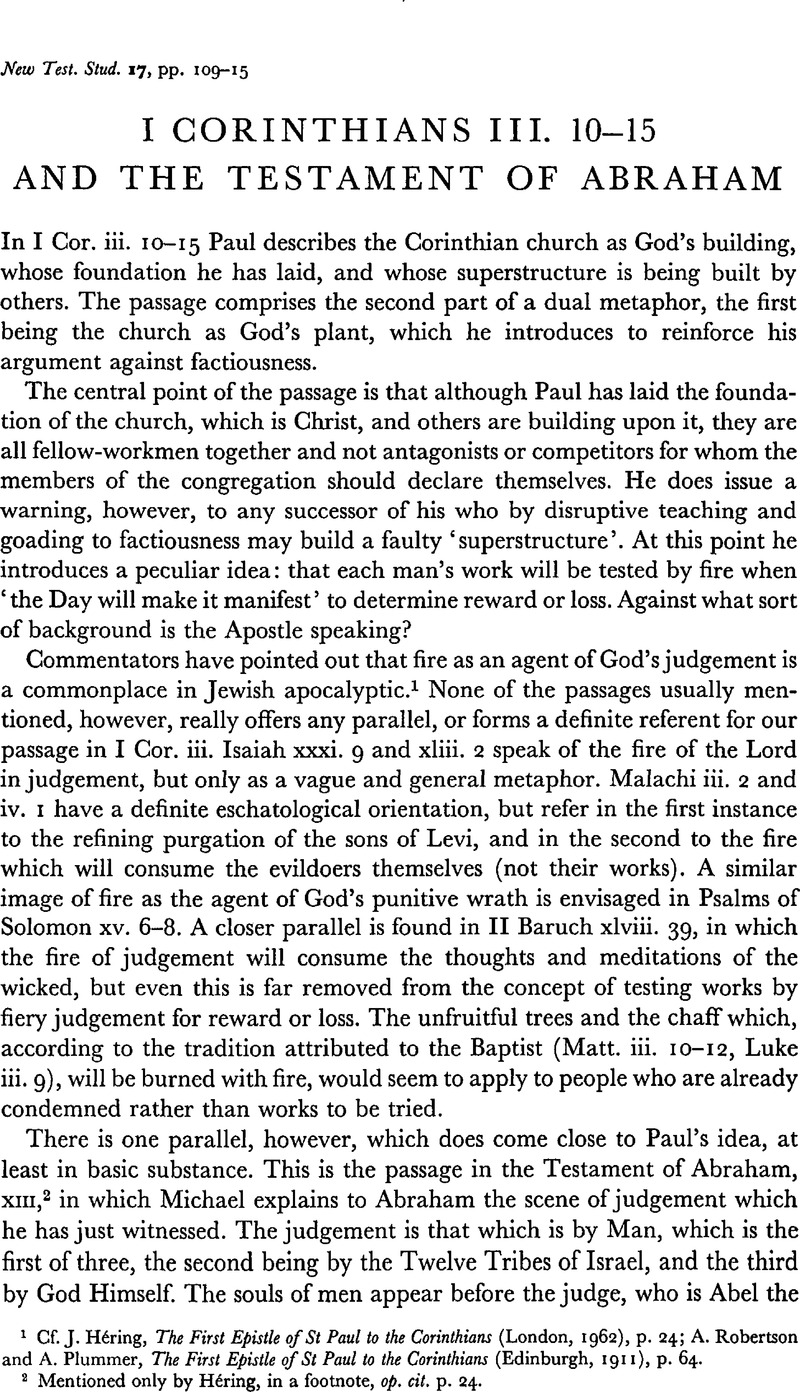Article contents
I Corinthians iii. 10—15 and the Testament of Abraham
Published online by Cambridge University Press: 05 February 2009
Abstract

- Type
- Short Studies
- Information
- Copyright
- Copyright © Cambridge University Press 1970
References
page 109 note 1 Cf. Héring, J., The First Epistle of St Paul to the Corinthians (London, 1962), p. 24Google Scholar; Robertson, A. and Plummer, A., The First Epistle of St Paul to the Corinthians (Edinburgh, 1911), p. 64.Google Scholar
page 109 note 2 Mentioned only by Héring, in a footnote, op. cit. p. 24.
page 110 note 1 Our translation is based upon the Greek text of James, M. R., The Testament of Abraham (Cambridge, 1892)Google Scholar. A complete translation into English may be found in Box, G. H., The Testament of Abraham (London, 1927).Google Scholar
page 110 note 2 Op. cit. p. 55.
page 110 note 3 Ibid. p. 49.
page 110 note 4 Listed and discussed, Ibid. pp. 50 ff.
page 110 note 5 E.g., James lists the passage in ch. XIII in which a soul's works are found to be balanced, and so the judge gives it ο⋯τε τοīς βασανισταīς … ο⋯τε τοῖς σωзομένοις, ‘neither to the torturers nor to the saved’. Jameslists Matt. xviii, 34 as a parallel, in which the phrase τοῖς βασανισταῖς is found. The context, however, is quite different; the phrase in Matthew refers to the earthly jailers of the debtor servant. It would seem that nothing more than a basic Jewish concept is operating here; moreover, the verb in Matthew is παρέδωκεν, whereas in the Testament it is έξέδωκεν. He also quotes the phrase τοῖς σωЗομένοις and lists Acts ii. 4 in comparison. This is a misprint; he apparently refers to Acts ii. 47. The phrase also occurs in I Cor. i. 18. But in both cases the context is entirely different, and its occurrence in the Testament can hardly be anything but the linguistic coincidence of a common term denoting the righteous who survive the final judgement. Another example is the phrase άοράτου πατρός, the ‘unseen father’, in ch. XVI, which he also lists as ‘unmistakably Christian’. The context is the scene in which the angel Death is summoned by Michael, ‘and he came with great fear, and stood before the unseen father’. There is nothing here which could not be written by a thoroughly Jewish mind of the first century A.D. It seems to us that these and three other references which James lists are hardly ‘unmistakably Christian phrases’.
page 111 note 1 J.Q.R. VII (1895), 581–606.Google Scholar
page 111 note 2 J.E. pp. 93 ff.
page 111 note 3 Op. cit. pp. xxvii-xxix.
page 111 note 4 The Relevance of Apocalyptic, rev. ed. (London, 1963), p. 129Google Scholar; The Method and Message of Jewish Apocalyptic (London, 1964), p. 61.Google Scholar
page 112 note 1 N.T.S. 1 (1954–1955), 219–23.Google Scholar
page 112 note 2 Of the present recensions, Turner suggests that B is older, and dates it no later than the third century A.D., and assigns Rec. A to the fifth or sixth century. For both recensions, however, he is compelled to stipulate ‘very much earlier’ Greek material, possibly even pre-Christian, since the language of both is essentially ‘Biblical’, Ibid. p. 222.
page 112 note 3 See further discussion in Robertson and Plummer, op. cit. pp. 41–3.
page 113 note 1 It is possible that both passages reflect the language of the second benediction of the Palestinian Recension of the Eighteen Benedictions, the Blessing of the Resurrection from the Dead, in which the Hebrew equivalent, ⌉∼Υ ℸ┐$$$┐ℶ, occurs in connection with the quickening of the dead.
page 113 note 2 Kohler, op. cit. pp. 591 ff.
page 113 note 3 Neither the three parallels just discussed nor the judgement passage in ch. XIII under consideration occur in the section suggested by Turner as part of a possible incorporated Christian apocalypse, op. cit. p. 220.
- 3
- Cited by


